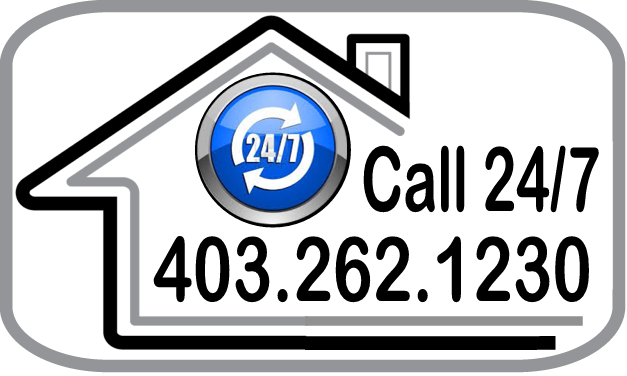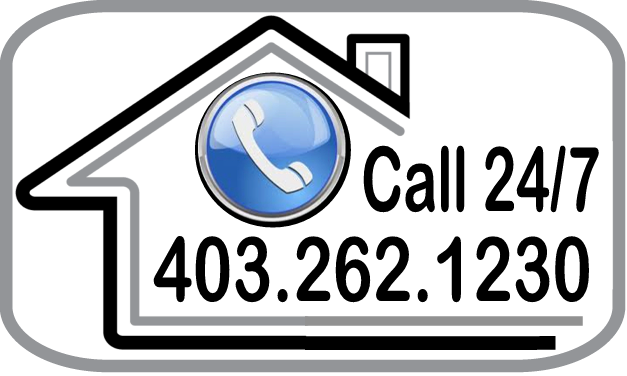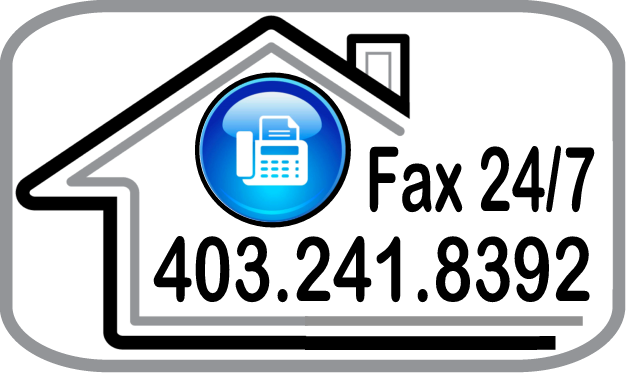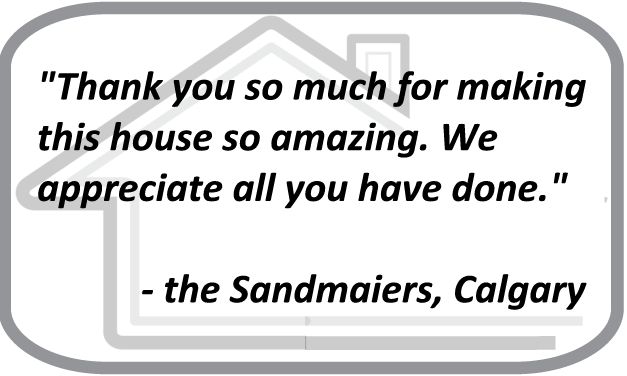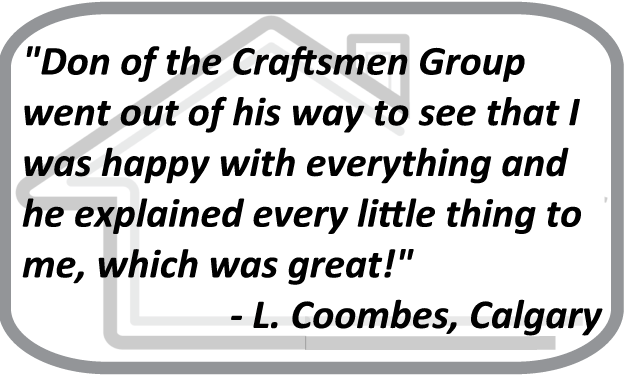The Craftsmen Group is dedicated to providing timely, advanced solutions to your cleanup and restoration problem. This starts right from your very first contact with our representatives. We will communicate openly and effectively with you and your insurance contacts to promptly address your situation. Our staff are fully certified in the latest skills and techniques to ensure that both you and your insurance company are confidant in our entire process – from initial damage analysis, to time and workmanship value quoting, through cleanup and re-build. Our extensive use of the industry leading Xactimate 28 software keeps the insurance contacts informed of our progress and allows The Craftsmen Group to efficiently maximize our vast and varied skills to provide the end user with an excellent solution to their disaster event.
A large part of being able to provide such effective and proficient solutions lies in the importance we place in striving hard to be as up to date and trained as possible in the many areas of restoration. Some of the major certificates and authorizations are listed below.
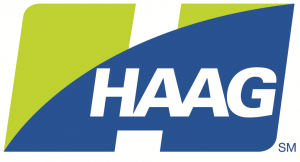 ‘HAAG CERTIFIED’. In the roofing and insurance industries, the phrase “Haag Certified” carries a lot of weight. It indicates that the holder of this designation can effectivley and efficiently inspect and assess damage. Report conclusions have a deeper level of crediblity: and possesses the extra authority required to provide accurate information for projects to be completed on time and on budget. Ultimately, with the damage assessment techniques gained in these Certification courses, the holder can increase your value as an inspector to your clients. Non ‘HAAG CERTIFIED’ inspectors often lack the skills and knowledge the possessor of these certifications have gained by passing courses developed and taught by practicing forensic engineers.
‘HAAG CERTIFIED’. In the roofing and insurance industries, the phrase “Haag Certified” carries a lot of weight. It indicates that the holder of this designation can effectivley and efficiently inspect and assess damage. Report conclusions have a deeper level of crediblity: and possesses the extra authority required to provide accurate information for projects to be completed on time and on budget. Ultimately, with the damage assessment techniques gained in these Certification courses, the holder can increase your value as an inspector to your clients. Non ‘HAAG CERTIFIED’ inspectors often lack the skills and knowledge the possessor of these certifications have gained by passing courses developed and taught by practicing forensic engineers.
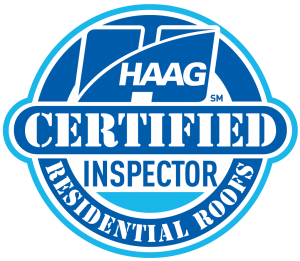 ‘HAAG RESIDENTIAL ROOF INSPECTOR CERTIFICATION”. The Haag Certified Inspector – Residential Roofs program is designed to create highly proficient inspectors regarding inspections of all major types of residential (steep-slope) roofs. The inspector understands (1) how hail and wind interacts with roofing, (2) inspection safety techniques, (3) roof area calculations, and (4) applicable codes. The inspector also gains comprehensive understanding of manufacture, installation, weathering, hail damage, wind damage, maintenance, mechanical damage, and repair costs for each major roofing type — composition, wood shingle/shake, concrete and clay tile, asbestos, fiber cement, and various synthetic, slate, and metal roofing types. This certification lays the groundwork for the inspector to truly understand the problems at hand, and thereby create an accurate and functional solution to the problem at hand.
‘HAAG RESIDENTIAL ROOF INSPECTOR CERTIFICATION”. The Haag Certified Inspector – Residential Roofs program is designed to create highly proficient inspectors regarding inspections of all major types of residential (steep-slope) roofs. The inspector understands (1) how hail and wind interacts with roofing, (2) inspection safety techniques, (3) roof area calculations, and (4) applicable codes. The inspector also gains comprehensive understanding of manufacture, installation, weathering, hail damage, wind damage, maintenance, mechanical damage, and repair costs for each major roofing type — composition, wood shingle/shake, concrete and clay tile, asbestos, fiber cement, and various synthetic, slate, and metal roofing types. This certification lays the groundwork for the inspector to truly understand the problems at hand, and thereby create an accurate and functional solution to the problem at hand.
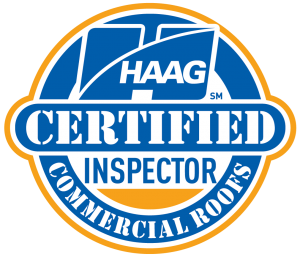
‘HAAG COMMERCIAL ROOF INSPECTOR CERTIFICATION”. In the Haag Certified Inspector – Commercial Roofs program, the inspector learns to assess damage to all major types of commercial (low-slope and flat) roofing systems. The inspector also becomes well versed in inspection safety, roof area calculations, codes and industry standards, and weather characteristics. For each roofing type discussed, instructors profile manufacture, installation, weathering, hail damage, wind damage, maintenance, mechanical damage, and repair costs. The certification covers built-up roofing, polymer-modified bitumen roofing, thermoplastic single-ply roofs (PVC and TPO), thermoset plastic single-ply roofs (EPDM, CSPE, PIB), SPF roofing, metal roofing, vegetated (green) roofing, low-slope roofing components, and roof coatings.
Carpet Repair and Reinstallation Technician (RRT). The Carpet Repair and Reinstallation Technician course teaches techniques and safety issues related to carpet repair and re-installation, carpet construction, inspection process prior to cleaning, tools of the trade, floor preparation, adhesives, carpet cushion installation, tackless strip and moldings, seaming, and proper stretching. This class also teaches various repairs that the carpet cleaner/restorer may come up against while dealing with an installed textile. This knowledge enables the technician to recognize and avoid installation problems that may arise while performing carpet cleaning as well as how to correct many issues encountered.
Institute of Inspection Cleaning and Restoration Certification (IICRC). When you see a IICRC logo, you can be confident that an IICRC-certified experienced, qualified professional is caring for your valuable property. IICRC Certified Firms employ technicians who, after study, field experience and passing comprehensive exams, have received IICRC certifications in specific cleaning, restoration and inspection categories such as upholstery, wood flooring, stone and tile flooring, carpet cleaning, odor removal, mold remediation, water damage, fire damage restoration and more. The Craftsmen Group is proud to hold many IICRC Certifications, including the following.
Upholstery and Fabric Cleaning Technician (UFT). The Upholstery and Fabric Cleaning Technician course covers upholstery fiber categories, fiber identification and testing, manufacturing of the fiber and fabric, chemistry of cleaning, upholstery cleaning methods, protections, spotting and potential problems. A student will have a specific knowledge about fabric and fiber content, as well as furniture construction. This enables students to identify limitations and potential cleaning related problems, on a given piece of upholstery.
Fire and Smoke Restoration Technician (FSRT). The Fire and Smoke Restoration Technician course concentrates on technical procedure for successfully completing the restoration of a fire and smoke damaged environment. Students learn how to combine technical procedures with a practical approach to managing the job site and how that relates to pricing the job.
Odor Control Technician (OCT). The Odor Control Technician course covers olfaction and odor, odor sources, detection process, theory of odor control, equipment, chemical options and applications. The student learns how to address odors caused from biological sources such as decomposition, urine contamination, and mold, combustion sources such as fire and smoke damage, and chemical sources such as fuel oil spills or volatile organic chemicals.
Water Damage Restoration Technician (WRT). The Water Damage Restoration Technician course teaches restoration personnel that perform remediation work to give them a better concept of water damage, it’s effects and techniques for drying of structures. This course provides residential and commercial maintenance personnel the background to understand the procedures necessary to deal with water losses, sewer backflows, and contamination such as mold.
Carpet Cleaning Technician (CCT). The IICRC-approved Carpet Cleaning Technician (CCT) course is designed to teach the art and science of carpet cleaning to professional service providers, as well as others in related industries. Emphasis is placed on practical application, identifying fiber, yarn and carpet constructions, style types and finishes, soiling conditions, cleaning science and methodology, and other issues and concerns faced by individuals who maintain and clean installed broadloom carpet. When coupled with additional on-the-job training and field experience, students should be adequately prepared to perform carpet cleaning techniques and procedures. They also should be adequately prepared to accomplish further training in other IICRC-approved courses, which require CCT as a prerequisite. The course is designed to cover pre-inspection, fabric identification, basic cleaning chemicals and equipment, and proper cleaning techniques and procedures with a residential and light commercial emphasis.
Applied Microbial Remediation Technician (AMRT). The Applied Microbial Remediation Technician course covers mold and sewage remediation techniques to individuals engaged in property management, property restoration, IEQ investigations or other related professions. Emphasis is placed on teaching mold and sewage remediation techniques to individuals who will perform these procedures in the field. Course graduates will be adequately equipped to perform remediation services, while protecting the health and safety of workers and occupants.


